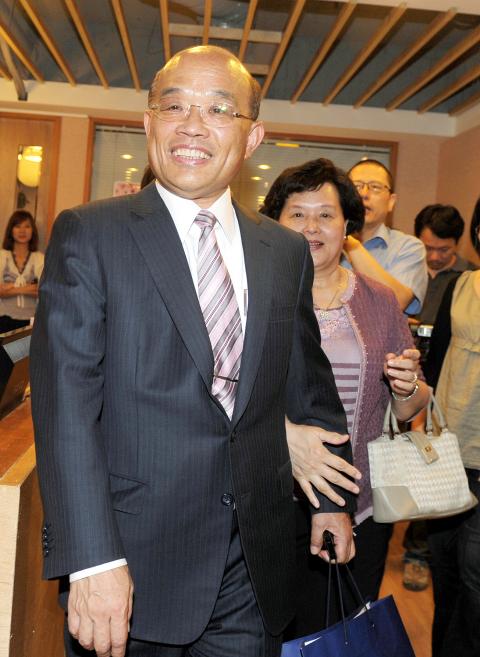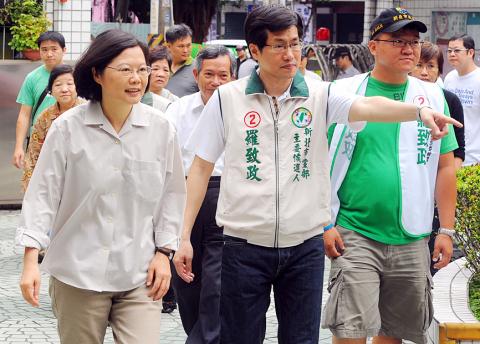Former premier Su Tseng-chang (蘇貞昌) yesterday became the new chairman of the Democratic Progressive Party (DPP), easily beating his four opponents in a race that could have a major impact on the future direction of the party.
Su obtained 50.47 percent of the vote by 163,808 registered members, with former Tainan County commissioner Su Huan-chih (蘇煥智) coming a distant second, with 21.02 percent.
The 64-year-old will serve as the DPP chairperson for the second time, after a brief stint between February and December 2005.

Photo: CNA
Su Tseng-chang, who was regarded as the front-runner from the outset, now has to live up to his pledge in election-eve advertisements in local dailies calling for party unity as the DPP faces major mayoral and commissioner elections in 2014 and a presidential election in 2016.
The turnout rate of 68.62 percent — an all-time high for the party — was better than the expected 50 percent, the DPP said.
A total of 240 polling stations for four elections were set up around the nation between 8am and 4pm.

Photo: Wang Min-wei, Taipei Times
In addition to a new chairperson, party members selected regional office directors and regional and national representatives.
Despite the election being described as a “four-on-one battle against Su [Tseng-chang]” televised vote counting results showed that he pulled away early.
Former chairperson Tsai Ing-wen (蔡英文), who resigned in March following her loss in the Jan. 14 presidential election, cast her vote in Yonghe District (永和), New Taipei City (新北市), in the morning and said that organizational work at the grassroots level would be crucial for the new party boss.
Former vice premier Wu Rong-i (吳榮義) was third with 16,315 votes, or 14.73 percent, while former DPP legislator Chai Trong-rong (蔡同榮) and former DPP chairperson Hsu Hsin-liang (許信良) ranked fourth and fifth, receiving 11.28 percent and 2.49 percent respectively.
Hsu, who is on a hunger strike over three appeals to President Ma Ying-jeou (馬英九), was taken to a polling station by an ambulance yesterday morning.
Hsu told reporters that the DPP should revive the spirit of protest from its early era regardless of who is elected chairperson, or there would be no one to monitor the president.
Acting DPP Chairperson Chen Chu (陳菊) said she hoped that the new chairperson would be able to “handle the cross-strait exchange issue appropriately” and help the party regain its confidence.
The handover ceremony will be held on Wednesday.
At a press conference last night, Su Tseng-chang said the high turnout in the vote made this a win for the whole party.
Ma, acting in his capacity as Chinese Nationalist Party (KMT) chairman, sent Su Tseng-chang flowers to congratulate him on his victory yesterday.
Asked if he would meet Ma to increase cross-party dialogue, Su Tseng-chang said such efforts should be made if it meant improving the lot of the people, but that if such a meeting were just for show, he would decline.
Candidates who were close to Tsai secured important and symbolic victories in regional director elections, with Lo Chih-cheng (羅致政) scoring a surprise victory over Chang Hung-lu (張宏陸), a Su Tseng-chang confidant, in New Taipei City, and Chuang Ruei-hsiung (莊瑞雄) winning a three-way battle in Taipei.

Tropical Storm Gaemi strengthened into a typhoon at 2pm yesterday, and could make landfall in Yilan County tomorrow, the Central Weather Administration (CWA) said yesterday. The agency was scheduled to issue a sea warning at 11:30pm yesterday, and could issue a land warning later today. Gaemi was moving north-northwest at 4kph, carrying maximum sustained winds near its center of up to 118.8kph and gusts of 154.8kph. The circumference is forecast to reach eastern Taiwan tomorrow morning, with the center making landfall in Yilan County later that night before departing from the north coast, CWA weather forecaster Kuan Shin-ping (官欣平) said yesterday. Uncertainty remains and

SEA WARNING LIKELY: The storm, named Gaemi, could become a moderate typhoon on Wednesday or Thursday, with the Taipei City Government preparing for flooding A tropical depression east of the Philippines developed into a tropical storm named Gaemi at 2pm yesterday, and was moving toward eastern Taiwan, the Central Weather Administration (CWA) said. Gaemi could begin to affect Taiwan proper on Tuesday, lasting until Friday, and could develop into a moderate typhoon on Wednesday or Thursday, it said. A sea warning for Gaemi could be issued as early as Tuesday morning, it added. Gaemi, the third tropical storm in the Pacific Ocean this typhoon season, is projected to begin moving northwest today, and be closest to Taiwan on Wednesday or Thursday, the agency said. Today, there would likely

DISRUPTIONS: The high-speed rail is to operate as normal, while several airlines either canceled flights or announced early departures or late arrivals Schools and offices in 15 cities and counties are to be closed today due to Typhoon Gaemi, local governments announced last night. The 15 are: Taipei, New Taipei City, Taoyuan, Tainan, Keelung, Hsinchu and Kaohsiung, as well as Yilan, Hualien, Hsinchu, Miaoli, Chiayi, Pingtung, Penghu and Lienchiang counties. People should brace for torrential rainfall brought by the storm, with its center forecast to make landfall on the east coast between tonight and tomorrow morning, the Central Weather Administration (CWA) said. The agency issued a sea warning for the typhoon at 11:30pm on Monday, followed by a land warning at 11:30am yesterday. As of

CASUALTY: A 70-year-old woman was killed by a falling tree in Kaohsiung as the premier warned all government agencies to remain on high alert for the next 24 hours Schools and offices nationwide are to be closed for a second day today as Typhoon Gaemi crosses over the nation, bringing torrential rain and whipping winds. Gaemi was forecast to make landfall late last night. From Tuesday night, its outer band brought substantial rainfall and strong winds to the nation. As of 6:15pm last night, the typhoon’s center was 20km southeast of Hualien County, Central Weather Administration (CWA) data showed. It was moving at 19kph and had a radius of 250km. As of 3pm yesterday, one woman had died, while 58 people were injured, the Central Emergency Operation Center said. The 70-year-old